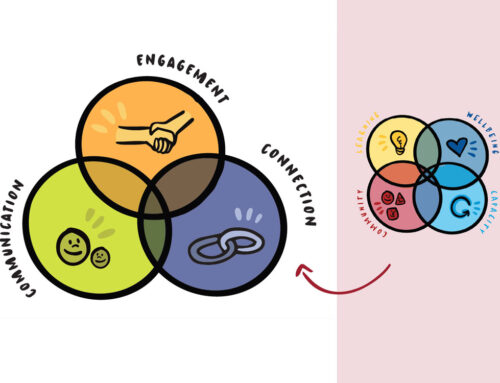VALUES IN ACTION
At Scotch Oakburn College, the values we uphold are not mere words; they are the essence of our community. These values were brought into sharp focus at the beginning of Term Two when the staff of the entire College engaged in a series of workshops with restorative practice leader David Vinegrad. Restorative practices align seamlessly with our values, emphasising respect, responsibility, and community. By engaging in restorative practices, students not only adhere to the College’s code of conduct but also embody the values that Scotch Oakburn holds dear.
VALUES IN ACTION
THROUGH RESTORATIVE PRACTICES
Restorative practices are techniques that aim to strengthen community ties and mend relationships by addressing harm through collective dialogue and responsible action. Rooted in restorative justice, they emphasise healing and reconciliation over punishment.
 These practices involve fostering respectful and empathetic connections, engaging the community in problem-solving, facilitating open and respectful conversations, and encouraging individuals to take responsibility for their actions. They also focus on repairing harm, perhaps through apologies or restitution, and promoting mutual understanding to maintain a cohesive community. Proactive strategies are used to prevent conflict and build a robust community foundation.
These practices involve fostering respectful and empathetic connections, engaging the community in problem-solving, facilitating open and respectful conversations, and encouraging individuals to take responsibility for their actions. They also focus on repairing harm, perhaps through apologies or restitution, and promoting mutual understanding to maintain a cohesive community. Proactive strategies are used to prevent conflict and build a robust community foundation.
Common methods include structured discussions for conflict resolution, meetings where all parties discuss harm and reparative actions, and peer mediation for finding agreeable solutions. Applied in schools, justice systems, workplaces, and communities, these practices support healing, accountability, and unity.
In today’s ever-evolving educational landscape, schools face multifaceted challenges beyond academic achievement. The holistic development of students involves nurturing character, fostering positive relationships, and instilling values that extend far beyond the classroom. At Scotch Oakburn College, these principles form the foundation of our ethos. This article explores how our core values intersect with the transformative power of restorative practices.

Restorative Practices: More Than Just Discipline
Traditional disciplinary actions often focus on punishment, but restorative practices take a different path. They are about understanding the impact of one’s actions, repairing harm, and restoring relationships. This approach acknowledges that mistakes are a natural part of the learning process. By encouraging students to reflect on their actions, restorative practices help them internalise the College’s values and understand their role within the community.
A study by the International Institute for Restorative Practices (IIRP) found that schools implementing restorative practices saw significant reductions in suspension rates and improved overall school climate. The research highlighted that schools using restorative approaches experienced a 40% reduction in suspensions and a 35% reduction in absenteeism, alongside enhanced student relationships and engagement.
 It is well documented that relationships are the foundation of a thriving school environment. Importantly, restorative practices foster a sense of belonging and interconnectedness among students, teachers, and the broader school community. By resolving conflicts through dialogue and mutual understanding, our approach at Scotch Oakburn strengthens the bonds between individuals.
It is well documented that relationships are the foundation of a thriving school environment. Importantly, restorative practices foster a sense of belonging and interconnectedness among students, teachers, and the broader school community. By resolving conflicts through dialogue and mutual understanding, our approach at Scotch Oakburn strengthens the bonds between individuals.
This emphasis on positive relationships ensures that every member of the College feels valued and heard, creating a supportive atmosphere conducive to personal growth and schooling success. Pleasingly at Scotch Oakburn, we know this is a strength of ours, highlighted with our student survey reports that are linked to classroom practices.
Across all eight competencies that are measures, the competency of developing positive relationships is rated most highly with an impressive rating of 3.4 out of 4.
What we also know is that within schooling environments mistakes are inevitable, but they are also opportunities for growth. Scotch Oakburn’s restorative practices encourage students to learn from their errors. This process involves taking responsibility, making amends, and devising strategies to avoid repeating the same mistakes. It is a holistic approach that not only addresses the immediate issue but also equips students with the skills and mindset needed for lifelong learning and personal development.
The implementation of restorative practices at Scotch Oakburn College is a testament to our dedication to values, the cultivation of positive relationships, and the empowerment of students to learn from their mistakes. These practices are not just disciplinary tools; they are educational strategies that prepare young individuals for the complexities of life beyond school.
By embracing restorative practices, Scotch Oakburn College is shaping a future where our students are not only academically accomplished but also emotionally intelligent, socially responsible, and equipped to contribute positively to society. Our staffing community’s commitment to restorative practices along with the support of our parents is a shining example of education that goes beyond academics, nurturing well-rounded individuals ready to face the world with confidence and integrity.
Ross Patterson
Principal







